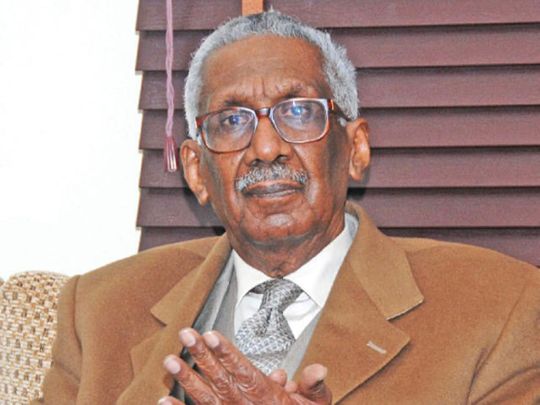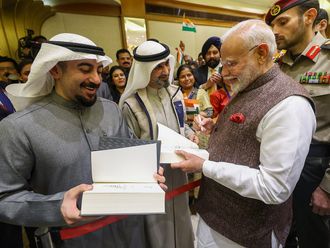
Dubai: Kuwait on Sunday lost one of the founding fathers of its constitutional system, political icon Dr. Ahmad Al Khatib who died on Sunday night at the age of 96.
For more than 60 years, Al Khatib was considered society’s moral compass as the country faced several political crises since the proclamation of its constitution in 1962 and the election of its first parliament a year later. “Farewell our national symbol”, wrote almost all Kuwaitis newspapers on their websites shortly after a family statement said the former politician had passed away.
Al Khatib was born in Kuwait in 1926 and upon finishing his schooling in 1942 left to Lebanon to study medicine at the famed American University in Beirut, where he graduated 10 years later as a doctor. However, in Beirut he learned more than medicine as he met leading Arab leftists, including George Habash and Wadee Haddad from Palestine and Hani Al Hindi from Syria. Influenced by the thoughts of Syrian Arab nationalist thinker Qustantin Zuraiq, the four friends founded the Arab Nationalists Movement in 1951, which became the basis for most Arab nationalist parties in the region. The movement originally called for Arab unity and the liberation of Palestine.
He returned to Kuwait in 1954 and following three years at the American hospital, he began his own private practice, which he continued well into the 1990s when he finally retired. But he was mostly interested in politics and befriended the then Emir of Kuwait Sheikh Abdullah Al Salem. They shared a similar way of thinking that led to the Emir establishing a constitutional council, the Founding Assembly, to draft a modern constitution that established in 1963 the Arab Gulf’s first democratically- elected parliament. Al Khatib was the deputy chairman of the assembly. He was elected to the first parliament along several members of the nationalist movement. They became the opposition block in that session as well as several more parliaments until he quit the parliamentary life in 1996.
He was arrested a number of times, mostly for protesting the dissolution of the parliament by the late Emir Sheikh Jaber Al Ahmed in 1976 and 1986. In May 1990, three months before Iraq invaded Kuwait, security forces stormed his house and arrested him along 20 other former MPs as they met to discuss ways to restore the elected parliament.
Since his retirement from politics in the mid-1990s, he has been warning of the deterioration of politics in Kuwait as well as in the Arab world. His last initiative was few years ago, calling for a national congress in Kuwait to renew commitment to the 1962 constitution following a number of political crises that gripped the country leading to the frequent resignation of the cabinet.











